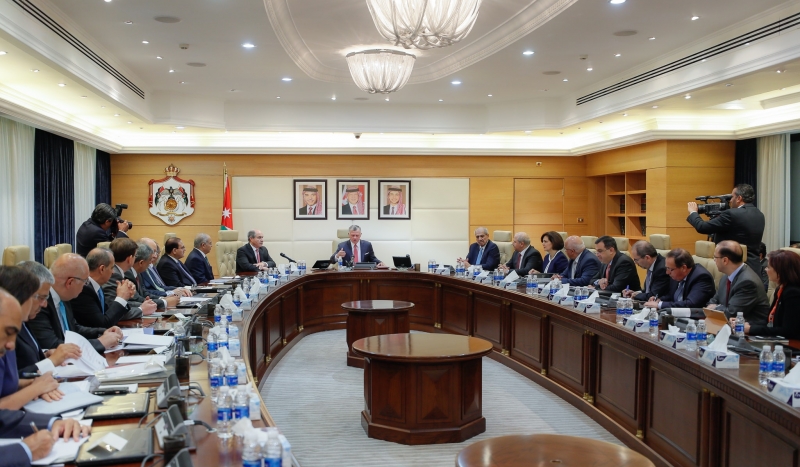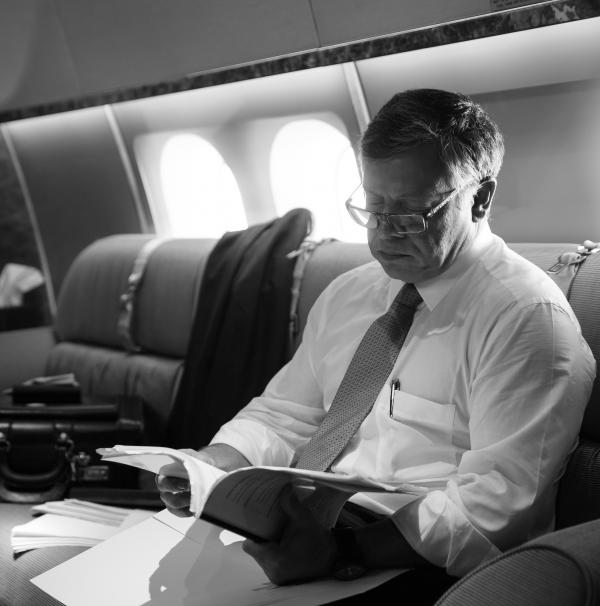King chairs part of Cabinet meeting

His Majesty King Abdullah visited the Prime Ministry on Wednesday and chaired part of the Cabinet meeting.
In remarks at the meeting, King Abdullah said all must work as one to overcome the challenges facing the country, stressing that crises only make Jordan stronger.
His Majesty voiced pride in the level of cooperation among state institutions, calling for learning lessons from crises to ensure better responses to future challenges.
The King expressed confidence that Jordan is on the right track.
Jordan’s efforts to safeguard Al Aqsa Mosque/Al Haram Al Sharif are continuous and permanent, His Majesty added, noting that they do not end with the end of crises.
The challenges in Jerusalem, the King continued, are political as well as security-related.
Turning to the Israeli embassy incident in Amman, His Majesty reaffirmed that Jordan will not relinquish the rights of its sons, adding that Israel is required to take the necessary legal measures to ensure justice is served.
Ensuring justice is a priority, the King said, and Jordan will be closely following the measures taken by Israel.
As for economic concerns, His Majesty acknowledged that it will take time to see results on the ground, and that the challenges are cumulative.
However, the King noted that a clearly defined economic programme is available, and the government is committed to implementing it.
All must work without delay on parallel fronts, His Majesty urged, to ensure that Jordan reverses the regression in economic indicators over the past years.
The King called for intensive work to address Jordan’s drop on the Ease of Doing Business Index, stressing the importance of streamlining business procedures to develop the investment climate.
Employees and officials must also deal positively with investors, in line with Jordan’s national interests, His Majesty added.
Turning to governorate and municipal council elections, the King urged concerted efforts by all the concerned institutions to support the Independent Election Commission and ensure that the polls are successful, enhancing the role of citizens in setting development priorities.
For his part, Prime Minister Hani Mulki said the government is closely following His Majesty’s relentless efforts to ensure the betterment of Jordan and all Jordanians, stressing that there is a strong will to tackle the daunting challenges ahead.
The government has some achievements on its record, Mulki noted, adding that it is also working on a number of reforms, upon the King’s directives, asoutlined in the Letter of Designation and in the discussion papers.
The prime minister said the government is taking steady steps towards political reform, while economic reform is progressing positively, citing indicators that Jordan is on the right track.
Further efforts are needed, he acknowledged, pledging that the work will be result-oriented in order to achieve the goals promised in the budget.
Mulki said administrative reform is another major challenge, highlighting efforts to review government procedures and ministries’ performance to enhance the services provided to the public.
He stressed the importance of drawing up the right plans to move ahead in this direction.
Social reform is also important, the prime minister continued, since it encompasses education, healthcare, and social services.
Reform, in all its dimensions, is a continuous process that shows results on the medium term, Mulki said.
He added that work is underway in earnest to implement the recommendations of the Royal Committee for Developing the Judiciary and Enhancing the Rule of Law.
During the meeting, several ministers briefed His Majesty on achievements in economic, political, and administrative reform; and future government plans in these domains.
Minister of Planning and International Cooperation Imad Fakhoury said his ministry has prepared a 2018-2022 action plan for the implementation of the Jordan Economic Growth Plan, which will be endorsed by the Cabinet soon.
Noting that Jordan has so far received 13 per cent of the promised aid for its Syrian refugee response this year, Fakhoury said it is higher than the amount received in the same period last year (10 per cent).
Eighty per cent of the pledged aid, which is expected to total $3 billion, tends to be provided by the end of the year, the minister explained.
Finance Minister Omar Malhas said the debt-to-GDP ratio dropped to 94.4 per cent in the first half of the year, expecting it to stabilise.
The economic correction programme, he added, is on the right track.
For his part, Minister of State for Investment Affairs Muhannad Shehadeh provided a briefing on the measures taken by the government to attract investments and streamline procedures for investors.
Energy Minister Saleh Kharabsheh highlighted major projects in the sector, such as the Green Corridor project to boost the national power grid’s capacity in order to accommodate new renewable energy projects in the southern region.
The ministry is now studying the potential of implementing a similar project in the Kingdom’s eastern region, Kharabsheh said.
ICT Minister and Public Sector Development Minister Majd Shweikeh said switching to e-government services is the best way to reform the public sector, adding that the procedures for 98 government services have been simplified.
This falls within efforts to combat bureaucracy, reinforce the rule of law, and eliminate corruption, Shweikeh added.
Also speaking at the meeting, Minister of Political and Parliamentary Affairs Musa Maaytah highlighted awareness campaigns related to decentralisation and the upcoming municipal and governorate council elections.
The government has issued the necessary by-laws to implement the Decentralisation Law, Maaytah explained, noting that the Ministry of Interior has also readied the headquarters of each governorate council and seconded the employees needed without hiring new ones.
Work is now under way to prepare the budget for governorate councils for 2018, he added.
Minister of Municipal Affairs Walid Masri said the government, over the past three years, has paid back 30 per cent of municipalities’ debts. It will repay the rest in full by the end of this year.
Measures have also been taken to control municipalities’ current expenditures and cut their administrative expenses, Masri added, noting that the ministry is also training municipal employees to build their capacities and is preparing a training programme to acquaint new municipal council members with the relevant laws and how they can coordinate with governorate councils.


